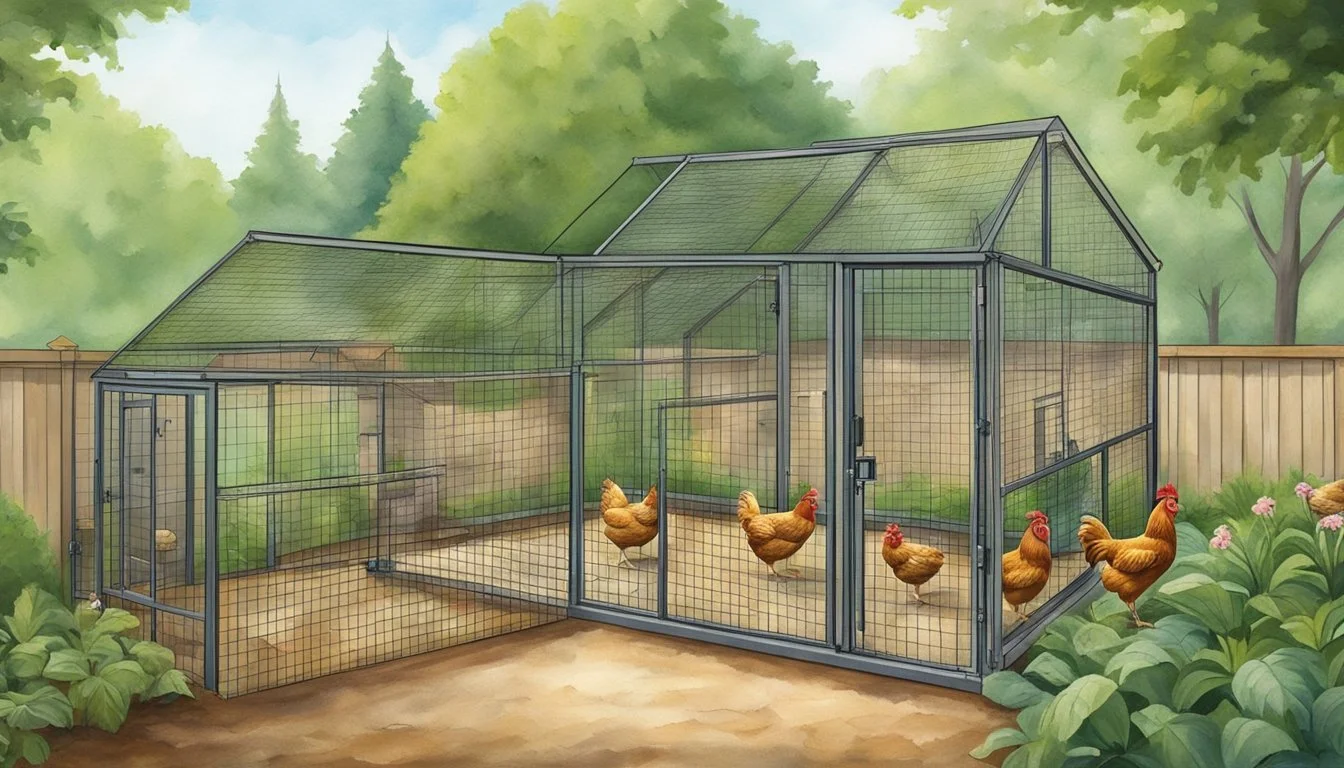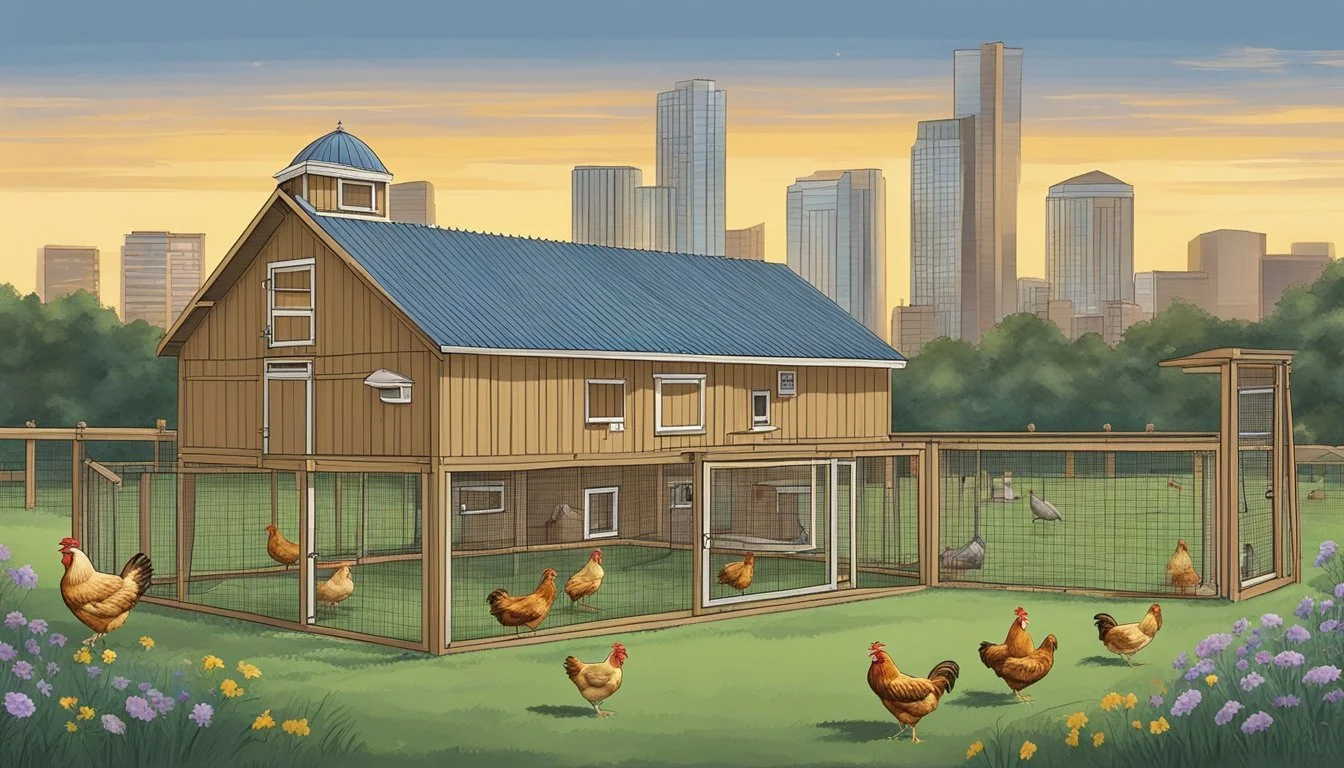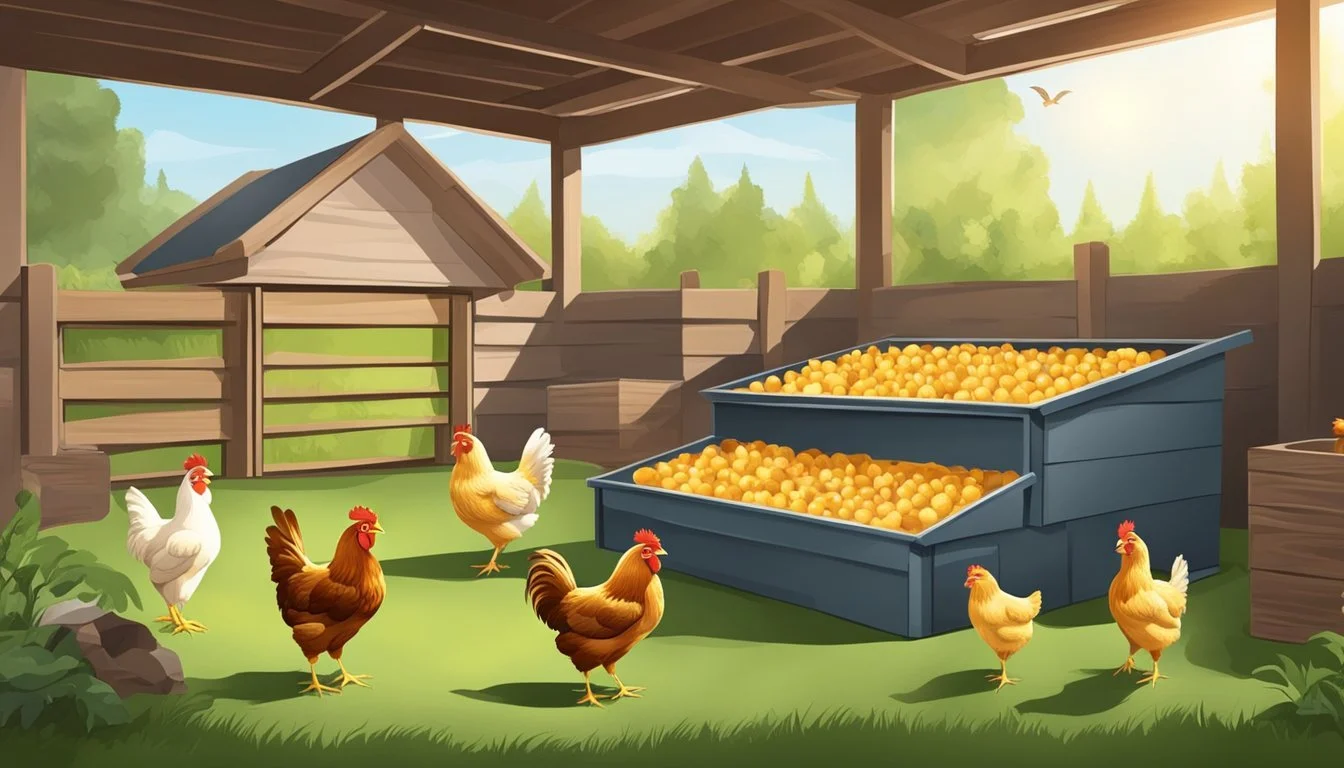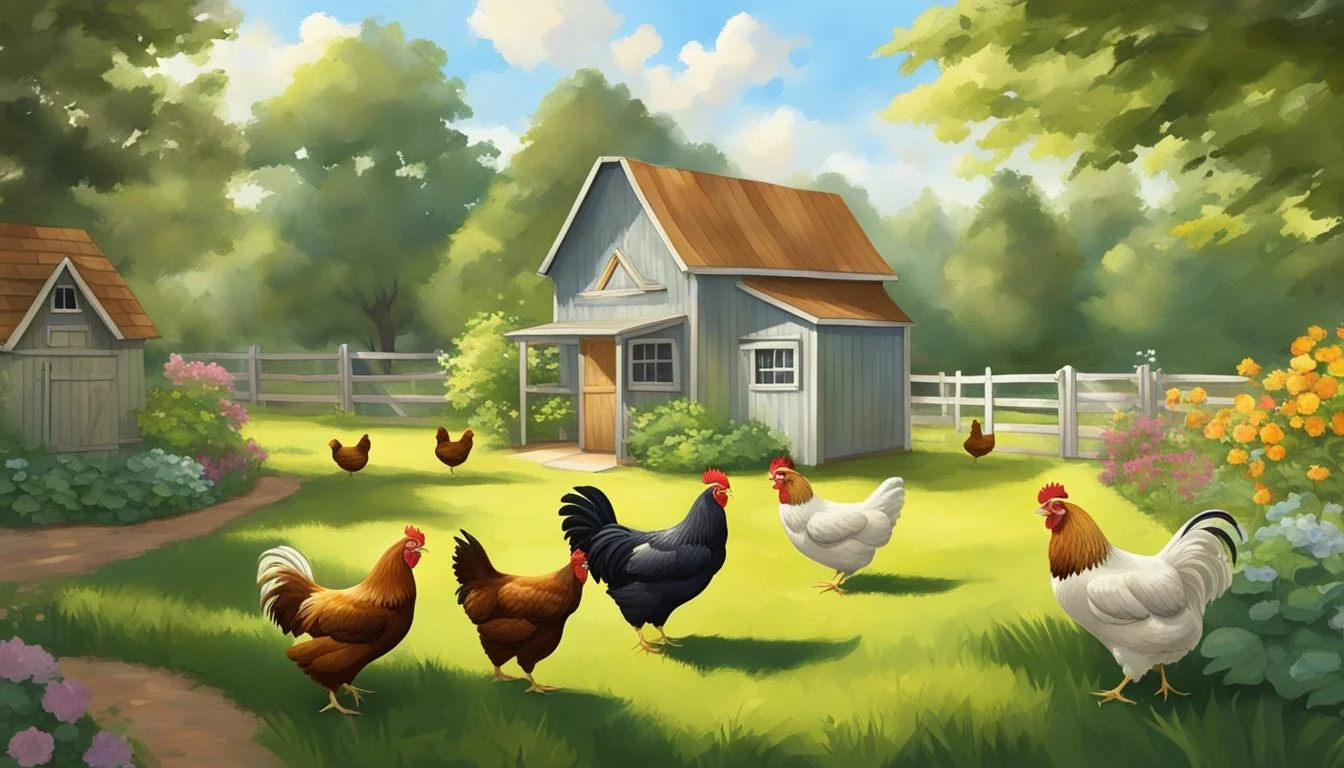Keeping Backyard Chickens in Birmingham, AL
Essential Tips for Urban Poultry Farming
Backyard chicken keeping has been embraced by many residents of Birmingham, Alabama, as a means to connect with self-sustainable practices and enjoy the benefits of fresh eggs. The city has specific regulations in place that govern the keeping of chickens to ensure that the practice does not cause disturbances or public health concerns. These regulations permit only the keeping of hens and firmly prohibit roosters, reducing noise issues that typically accompany male chickens.
The number of hens that a Birmingham resident can legally keep is dependent upon the size of their property. For smaller lots, the city generally allows up to six hens. Residents are required to maintain proper housing for their chickens and provide sufficient food and water. The chickens must be kept in a secure environment not only for their safety from potential predators but also to prevent them from escaping.
In addition to animal welfare, Birmingham’s chicken keepers must also manage manure appropriately to minimize environmental impacts and health risks. These guidelines demonstrate the city's commitment to keeping the practice of raising backyard chickens compatible with urban living, ensuring the benefits are enjoyed without compromising community standards or neighborly peace.
Understanding Birmingham's Chicken Ordinance
Residents of Birmingham, Alabama who are interested in keeping backyard chickens must follow specific city ordinances to ensure compliance with local laws.
Key Regulations and Permits
City of Birmingham regulations state that keeping backyard chickens is permitted, but with clear directives. One notable ordinance is that only hens are allowed; roosters are not permitted due to noise concerns. The maximum number of hens allowed on a property is dependent on the size of the lot. Those with less than one acre can keep a maximum of six hens.
Permits: For residents within Birmingham, there is no explicit mention that a permit is required to keep chickens. However, confirming with the city before setting up a chicken coop is advisable as regulations may change.
Contact for Clarity: To obtain the most current information, residents should contact Birmingham's Building, Engineering and Zoning Department or their local city council representative.
Understanding Zoning Restrictions
Zoning restrictions play a vital role in chicken keeping within the city limits. The Birmingham Alabama Chicken Ordinance is in alignment with the E-1 Estate District regulations, which have specific stipulations on livestock and accessory structures.
Property Size: One horse is permitted on lots of a minimum area of 43,560 sq. ft. (1 acre) but for chickens, the ordinance aligns with property size to determine the number of chickens allowed, with six being the threshold for under an acre.
Coop Restrictions: There is an implied need for an adequate chicken coop, though details on distance from neighboring homes, size, or construction of the coop should be verified with the city, as these may fall under Building Code Restrictions.
It is essential for Birmingham residents to understand these ordinances and zoning restrictions to legally keep and manage backyard chickens within the city limits.
Chicken Care Essentials
Keeping backyard chickens requires attention to their basic needs for food, water, shelter, and health. Ensuring these essentials will help maintain a happy and productive flock in Birmingham, Alabama.
Food and Water Requirements
Chickens' diets should be well-balanced, consisting of quality commercial feed and occasional treats. The main feed should be a formulated layer pellet or crumble that includes all the necessary nutrients. In addition to their regular feed:
Grains: Small amounts can be given as treats.
Greens: Provide leafy greens, which can also help with stress.
Calcium: Necessary for strong eggshells, often provided in the form of oyster shell supplements.
For water:
Always have clean, fresh water available.
Water containers must be cleaned regularly to prevent the spread of disease.
Shelter and Housing
Proper housing is critical for the protection and comfort of backyard chickens. Key features of a safe coop include:
Nesting Boxes: One box for every three to four hens.
Roosting Bars: Allow for the natural roosting behavior of chickens.
Ventilation: Good air flow without causing drafts.
Insulation: Protect from Birmingham’s varying weather.
Coops should also be secure to:
Predator Proof Your Coop: Use hardware cloth, secure locks, and proper fencing to keep out predators.
Adequate space is crucial to prevent stress and pecking order issues.
If the property is spacious, consider a run to allow chickens to forage.
Health and Maintenance
Routine maintenance of the coop and attention to health issues are crucial for keeping chickens. This includes:
Cleaning: Regular cleaning of the coop and water containers to prevent disease.
Observation: Daily checks for signs of illness or injury.
Pecking: Monitor pecking behavior, as it can indicate stress or health issues.
Baldwin County extension programs can offer advice specific to local Alabama conditions.
By adhering to these essentials, Birmingham residents will provide a healthy environment for their backyard chickens, ensuring the welfare and productivity of their flock.
Life Cycle and Breeding
The journey of backyard chickens in Birmingham, AL, encompasses their entire life cycle from chicks to adult layers and involves particular stages like egg laying and incubation that are pivotal for successful breeding and flock maintenance.
From Chicks to Adults
Chickens begin their life as chicks, which require careful nurturing after hatching, either from a hatchery or under a broody hen. During the first weeks, chicks follow a strict diet starting with an 18-20% starter feed. They typically transform into pullets or young hens at about 14 weeks. This phase is critical as they grow and develop into mature adults, with the hen reaching laying maturity around 18 weeks. Depending on the breed, Roosters may start to exhibit crowing and territorial behavior as they mature.
0-8 weeks: Feed starter crumbles (18-20% protein)
8-14 weeks: Transition to starter/grower feed (16-18% protein)
15-18 weeks: Switch to finisher feed (16% protein) until they are ready to lay
Birmingham's ordinance only permits the keeping of hens and not roosters, emphasizing the management of layers rather than the breeding process.
Egg Laying and Incubation
A hen's egg-laying period starts at about 18 to 22 weeks of age, at which point they are considered adult birds. The number of eggs a hen produces varies, with some breeds laying almost one egg daily, while others may lay less frequently. Hens in an urban backyard setting, such as Birmingham, are generally kept for their egg-laying abilities.
Hens require a comfortable and secure nesting area to lay their eggs. If breeding is the goal, eggs must be incubated to hatch. Incubation can be naturally done by a broody hen or artificially using an incubator. The typical incubation period for chicken eggs is 21 days.
Comfortable nesting area: Necessary for hens to lay eggs regularly
Incubation: 21 days, by broody hen or incubator
Owners in Birmingham are encouraged to focus on egg production and chicken care rather than breeding, given the city's restrictions on rooster ownership.
Chicken Behavior and Social Structure
In the dynamic social world of backyard chickens in Birmingham, AL, understanding their behavior and social structure is crucial for keeping a harmonious flock. Notably, the pecking order establishes a bird's rank, and communication is key to social interaction.
Understanding the Pecking Order
The pecking order is a hierarchical system determined through behaviors such as pecking and posturing. It is observed in both hens and roosters, though roosters typically stand at the top of this social ladder. Hens establish their ranks below the roosters, with dominant hens often having priority access to food and preferred roosting spots.
Top-ranked birds display more pronounced plumage and are often the first to access resources.
Lower-ranked chickens may exhibit more submissive behavior, such as waiting to eat until higher-ranked birds have finished.
Communication and Social Interaction
Chickens communicate through a variety of vocalizations and body language signals. They convey their place in the social structure, intentions, and alert others to food or threats.
Clucking is commonly used by hens to gather chicks or signal the discovery of food.
Crowing by roosters serves as a territorial call and can maintain the pecking order.
Social behaviors such as roosting together at night and oiling, where birds maintain their plumage using the oil gland near the base of their tail, are important for maintaining social bonds and health.
Chickens may also use their beaks for preening, a behavior that keeps their feathers clean and in good condition, which is vital for insulation and flight.
Clearly, the social dynamics of backyard chickens are complex, and recognizing these behavior patterns is important to ensure a stable and healthy flock.
Legal Responsibilities and Community Relations
In Birmingham, Alabama, individuals keeping backyard chickens must adhere to specific legal responsibilities while maintaining positive community relations to mitigate public nuisance concerns.
Handling Complaints
Property owners are legally required to address any complaints related to the chickens causing a public nuisance. This includes concerns like excessive noise—which specifically pertains to roosters, often deemed too noisy for residential areas—and environmental impacts, such as odors or waste management issues. To handle complaints effectively:
They should respond to any grievances promptly and respectfully.
They should ensure that their chickens do not create excessive noise, particularly during early morning or late night hours, which would violate noise ordinances.
Being a Good Neighbor
Fostering good community relations is paramount for backyard chicken keepers. Misconceptions about chickens being inherently noisy or messy can be dispelled through effective communication and responsible practices. Here's how they can be considerate neighbors:
Environmental Responsibility: Maintain clean coops to prevent odors and keep rodent attractions minimal.
Social Media Engagement: Utilize local social media groups to share experiences and advice, offering insights into responsible chicken keeping.
By engaging in dialogue and educational efforts, they can demonstrate the reality of backyard poultry care and its compatibility with a community lifestyle.
Predator Management and Protection
When maintaining a backyard flock in Birmingham, AL, it's paramount to prioritize protection against predators that pose a threat to chickens. Predators like dogs, coyotes, bobcats, foxes, raccoons, and various birds of prey are common in Alabama and can jeopardize a flock's safety. Therefore, effective predator management must be a core aspect of chicken keeping.
Coops must be designed to withstand predator intrusions. They should have sturdy walls and a secure door. It's advisable to use hardware cloth instead of chicken wire, as it's more durable against attacks. The coop should be locked at night when predators are most active.
For runs, they should be covered with a wired roof or net to prevent aerial attacks. Gaps beneath fences need to be minimized to deter digging predators. One can also bury a hardware cloth apron around the coop and run to discourage invaders such as rodents and small mammals known for tunneling.
Regular inspection of the chicken coop and runs is crucial. Checks for vulnerabilities like holes, loose wires, or signs of attempted entry should be part of the routine management tasks. Rodents not only steal food but also attract larger predators. Ensuring cleanliness and securing feed in rodent-proof containers can help minimize their presence.
In summary, responsible management of a backyard chicken environment necessitates vigorous and proactive measures against potential threats. Keeping the flock safe involves a combination of solid construction, rigorous maintenance, and awareness of the local wildlife that might view chickens as prey. By implementing these strategies, one can ensure the well-being of their chickens in Birmingham, Alabama.
Supplementary Information
This section provides insights into local provisions and educational support systems available for backyard chicken keepers in Birmingham, Alabama. It details where to find supplies, as well as opportunities for learning and community involvement to ensure successful poultry husbandry.
Local Resources and Supplies
Birmingham offers several local stores and farm suppliers where chicken keepers can procure quality feed, coops, and other necessary supplies. They can also connect with local farmers for insights on best practices and potentially source heritage chicken breeds. Cities like Auburn, Mobile, Montgomery, and Huntsville have various outlets that provide essential materials for keeping backyard chickens. The Alabama Cooperative Extension System is a valuable resource for practical advice on poultry housing, nutrition, and health management.
Feed & Equipment Suppliers:
Feed stores in the Birmingham area.
Farm supply outlets in Auburn, Mobile, Montgomery, and Huntsville.
Local Farmers:
Networking for breed selection and care tips.
Possible source for chickens and farm-fresh feed.
Educational Opportunities and Support
The Alabama Cooperative Extension System and Auburn University's Poultry Science Department spearhead educational support in Birmingham. Prospective and current chicken keepers can benefit from workshops, online resources, and community programs focused on backyard poultry care. Joe Hess, or similar experts in the field, could be leading informative sessions on maintaining healthy flocks and optimizing egg production.
Alabama Cooperative Extension System:
Workshops and seminars on backyard chicken care.
Online resources and guidance documents.
Poultry Science Department at Auburn University:
Educational programs led by faculty, like Dr. Joe Hess.
Research-based insights into poultry health and management.
City-Specific Considerations
When raising backyard chickens in Birmingham, Alabama, residents are required to adhere to city-specific regulations. These rules are in place to maintain community standards and animal welfare.
Raising Chickens in Other Alabama Cities
Daphne: Regulations may differ from Birmingham. Potential keepers need to consult local ordinances.
Mobile: Similar to Daphne, Mobile has its own set of rules for backyard chickens. Always check with city regulations.
Huntsville: Due to varying climates, chicken breeds suited for colder temperatures may be necessary.
Montgomery: The capital city will have distinct guidelines and restrictions for raising chickens within city limits. It is important for residents to familiarize themselves with Montgomery's unique requirements.
Fun Facts and Additional Insights
This section offers intriguing trivia about backyard chickens, enhancing the reader's understanding of the joys and peculiarities of raising these feathered pets.
Interesting Chicken Trivia
Fresh Eggs: Backyard chickens in Birmingham, AL, not only serve as delightful pets but also provide their owners with fresh eggs. An average backyard flock can consist of around 25 chickens, each contributing to a bountiful daily yield of fresh eggs.
Backyard Chickens: Chickens, often considered quintessential backyard pets, are known for their varied breeds and behaviors. Unlike ducks which may need access to water for swimming, chickens typically do not require a pond or stream.
Pet Companions: While chickens are commonly kept for eggs, many owners in Alabama also value them as pets. They are easier to manage than larger farm animals like horses and require less space compared to goats.
Poultry Variety: Not all chickens are the same; there are breeds with distinctive features such as "Top Hats," which boast a unique plumage arrangement on their heads that resembles a hat.
By considering these facts, potential chicken owners in Birmingham can appreciate the multifaceted nature of keeping backyard chickens, from the practical benefits of fresh eggs to the enjoyment of their varied and interesting characters as pets.









